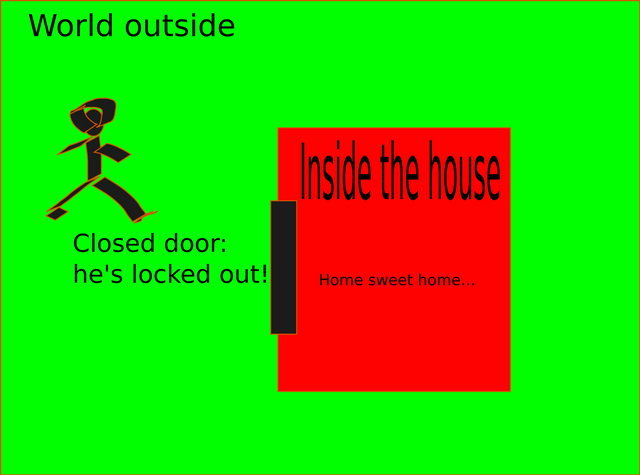About Måneskin's winning song “Zitti e buoni”
Italian band “Måneskin” won San Remo, the festival of the Italian song, and now also the Eurovision 2021, and it seems they are doing great in UK ranking.
In case you wonder, no, “måneskin” isn't an Italian word: it's Danish for moonlight.
Italian band without an Italian name
The winning song's title is “Zitti e buoni”, which I can roughly translate as “shut up and be good” or maybe “be quiet and be good” — not a professional translator here, but I will try to translate the song for you.
Before doing that, let me say that it's crap. I don't know why they won, who voted them and why, but this song is crap. You might like the sound, the genre, the performance… I don't care: as music is concerned, this is crap. It also reminded me of something else, but I couldn't identify what.
Maybe you like it, but…
It's a crap song. I understand you disagree. And I don't care: when it comes to music, I am picky. And if it is music sold worldwide as Italian music, I am even more picky. When you are used to so called classical music, these short pieces of the popular kind need to have a little bit more than — well — the fun of making noises and palatable riffs who sell well among the musically untrained and maybe still pimply youngsters.
If this is the rock today, the rock is dead — whatever it means. And come on, the rebel archetype can charm those pimply youngsters I mentioned above, but grown-up should be more than bored, almost annoyed by the empty rhetoric of the gestures.
Performance-wise, they work. But, is this today the criterion by which you measure a song's quality? I hope not.
The exploitation of certain implicit or explicit rhetoric — rebel against the overimposed rules, be crazy, be yourself (you are original), be free, do what you want, nobody can understand you, let them talk… — is abused, and allowed mostly because it seems cool and harmless. But indeed socially it's a wedge hammered in the generational slit to unglue generations and nurture alienation and group loneliness, which pay back well in this consumistic world.
The template youngsters must be forged on, needs not to be the one parents and family can give: youngsters must be educated by TV and the entertainment society. That's why Måneskin's performance mattered so much, why the festival della musica italiana (Italian music festival) and the Eurovision are so much about the show, and a lot less about the music.
Let's translate and comment the lyrics
The lyrics sung might differ a little bit from the original — for instance, a couple of bad words were changed into polite words — this has a lot to do with the hypocrisy of these kind of shows. Singer-song writers shouldn't attend shows which force them to change lyrics, but of course everybody does bend to the force of the censorship.
I try to keep the same order of words as much as possible, and this will make the translation even oddier — but don't worry: songs' lyrics don't always use a strict grammar, full sentences, and alike: it sounds odd also in Italian… (The lyrics don't make very much sense: they try to give images, fragments, but they are just a pretext.)
Loro non sanno di che parlo
They don't know what I talk about. This is two themes in one: 〈they don't understand me〉, and 〈I am far ahead〉.
voi siete [vestiti] sporchi, fra', di fango
Your are dirty, bro, with mud. “Voi siete” (you are) is in the original lyrics, but to me it seems that at the Eurovision he sang “vestiti” (clothes). The word “fra'” is short for “fratello”, singular, or “fratelli”, plural, as in this case (because “voi siete” is you are, but plural only). Hence I translated it as “bro”. And as “bro”, it is colloquial, and used mainly by youngsters.
giallo di siga tra le dita
Yellow of cig between fingers. When you smoke a lot keeping cigarettes between two fingers, it happens that the skin in contact with the burning cigarette becomes yellowish. “Siga” is another colloquial short-form word (siga-retta, cig-arette).
io con la siga camminando
I with the cig walking — I'm walking with the cig. Literally “Io” is “I”; in English maybe it is more appropriate to use the oblique case? Like: Me with the cig walking — it sounds odd in Italian as in English, though, if you consider the grammar strictly. Implying a “sto” in Italian, and reordering: “io sto camminando con la sigaretta”; in English, you come up with a complete correct sentence adding “am”: I am walking with a cig (smoking it, or keeping it between the fingers, …).
scusami ma ci credo tanto che posso fare questo salto
Excuse me, but I believe a lot that I can do this jump.
anche se la strada è in salita
Even if the road is uphill
per questo ora mi sto allenando
that's why now I am traning.
Let's pause and see what we've so far.
There's this guy who talks, but they don't know about what, or don't understand the topic. Then the guy addresses you (plural), a mud-dirty “brotherly” party. These “brothers”, or/and maybe the guy himself has “yellow of cigarettes” between their/his fingers. The guy walk with a cigarette (that is, smoking it, or maybe keeping it between his fingers), and he says he believes he can do something, supposedly something hard which will bring him in a better situation. But reaching the goal is in fact tiresome (like a uphill road — especially for a smoker), but he's preparing himself to succeed.
e buona sera signore e signori, fuori gli attori
And good evening, ladies and gentlemen, get out the actors
vi conviene non fare più errori
It's better you don't make errors anymore. This is how he sang it at the Eurovision. The original lyrics say “vi conviene toccarvi i coglioni”: it's better you touch your balls — a superstitious gesture — it is a totally different thing… Yet, the authors must consider this change unaltering the “deep meaning” of the song … simply because the lyrics are even crappier than the music.
vi conviene stare zitti e buoni
It's better you shut up and be good.
qui la gente è strana tipo spacciatori
Here people are strage, like drug dealers. You know, drug dealers are strange persons…
troppe notti stavo chiuso fuori
Too many nights I was locked outside. This cheap inversion of the usual expression “stare chiusi dentro” (to be locked inside) is, well, cheap. Trivial. The outside becomes the inside, and viceversa. If I say “la notte sto chiuso dentro” (at night, I am locked inside) I could mean simply that I don't go out at night. Invert, and you have a person who often stays outside at night, as if he were unable to return home. Coooool. As a teenager would say.
mo' li prendo a calci 'sti portoni
Now I kick these doors. The anger of the pimply youngster starts to raise. It makes no sense. He's locked out, metaphorially, and he wants to crash doors — to enter back home?
Crap. But notice the assonance and where the stress falls (marked with the ` accent):
... fuÒ-ri
... por-tÒ-ni
Then I can understand the verse and forget about the meaning. Just imagine the same guy who talks but isn't understood, surrounded by mud-dirty brothers (and sisters…), while he walks and smoke outside at night with the urge to kick doors…
About doors — “porta”, a feminine word, is door; “portone” (singular of “portoni”) is literally an augmentative, but it would be wrong to translate it as “big doors”. A “portone” is just a doorway or main entrance (with a door, of course), like the one to enter a building, rather than a particular flat.
sguardo in alto tipo scalatori
look upward, like climbers. Tipo… “I am, like, you know, happy, but also, I don't know, like unhappy, because, you know, like sad and gay at the same time”. This is teenagers' speak.
Now we know that the guy whose listeners don't know what he speaks about, with mud-dirty brothers, walking and smoking outside home, from where he feels locked out, wishing to kick doors while in the world there exists people as strange as drug dealers, this guy walk looking up, as climbers do!
quindi scusa mamma se sto sempre fuori
Then excuse me mom if I am always outside (that is, not at home — but later he plays with the word, maybe). Then (quindi) makes you think there's a logical consequence… But, can you see where it is? I smoke and walk, looking up as climbers, I feel not understood (nobody knows what I talk about) … want to kick doors … … … … then, excuse me, mom!
What a blatant crappy non-sense lyrics. Just to make some noise, how he yells in the Eurovision performance.
ma sono fuori di testa
But I am out of my mind — “sono fuori di testa” could be simply I am mad or insane. However, in Italian “sono” could be both “I am” and “they are”. The next line, however, uses “diverso”, which is singular. Then “sono” must be “io sono”.
ma diverso da loro
But different from them. Them — the muddy ones? No, because these are you, not them. The drug dealers, then? Or maybe those who don't know what he talks about?
e tu sei fuori di testa
ma diverso da loro
And you are out of your mind, but different from them. Again, them who?
siamo fuori di testa
ma diversi da loro
We are out of (our) minds, but different from them.
This is the distillate of the idea of “originality” which is so much loved by youngster: you are you, you are original, you are special in your own way, you can be “crazy” and whatever, you don't need to stick to the rules and stereotypes of the society as a whole, then you'll be considered “crazy”, but… whatever! But at the same time, you are a part of a (small) group, the one made of people who are like you with respect to the fact of being crazy. However, being part of this group doesn't mean you have to stick to any non-crazy policy, so you keep your originalty. You are not wrong, they are. You and your kind aren't wrong, but there are “They”, who are.
In order to make you “special” but at the same time part of a group — even if a group of loners — there must be a “They”, the “enemy”, so to speak.
This might seem a positive message, but as mentioned before, from a sociological point of view, this becomes just a wedge in the generational slit to keep it open and to make it bigger. Why in the generational slit and not between any other border? Because this kind of message has great grip over youngsters who feel not understood by their parents and constrained by non-crazy rules of an oppressive society — except when it is about fear, e.g., fear of a virus: then they run under the whip as any other sheep! Anyway, exceptions apart, they (the youngsters) can't do whatever, and then “They” (the others) might be some kind of crazy of their own (“we are crazy, but even if we are, we are different from them” implies that “them” refers to a group who can be crazy as well), but not in a positive sense as in the case of them (the youngsters).
Confused? Whatever!
io ho scritto pagine e pagine
I wrote pages after pages. So, he's a writer who lives outside, walking and smoking, in a city where there are people as strage as drug dealers (or maybe viceversa), and he can't go back home (with mom?) and perhaps that's why he wants to kick doors. But he believes he can make it, and he's working hard to reach a hard goal — the metaphor of the road uphill and the training is funny if you think he smokes so much that his between-fingers is yellowish.
ho visto sale e poi lacrime
I saw salt and then tears. This “ho visto …” (I saw) could mean “I experienced” (the harshness of life, suffered and cried…?) but also “I've seen other experiencing” hard times which brought them into tears.
Again, notice another cheap assonance: words seem to be chosen for the stress in the verse and this assonance, almost a rhyme, but not so blatant — just a little bit less blatant, if you think of it:
pà-gi-ne
là-cri-me
And the thing gets worse in the next line.
Questi uomini in macchina e non scalare le rapide
These men in the car, and don't climb the rapids. What the f… this means? Rapids aren't exactly a waterfall, but sure it's hard to “climb” them… the climb-metaphor, if this was the purpose, is f…ed up anyway.
And the men in the car(s)? Macchina is singular, but if we want to say that they are in a single car, we say “nella macchina”; consider “in macchina” as an adverb, so that it can mean there is a car, or many different cars…
Anyhow, who are they? When have we met these men? Are they the drug dealers? The odd ones in general? Who are they? And, there are these men inside a single car (macchina is singular), or he means there are several cars, each with one or more men inside?
Anyway… There must be a deep metaphor, right? … Wrong. It's just crap. But you may disagree, of course.
About rapids, again it is a lot more obvious to explain it with the cheap assonance trick, and the urge of sticking words into a meter:
pà-gi-ne
là-cri-me
rà-pi-de
See? You don't need to understand Italian to see it! Don't forget that Italian vowels aren't like English vowels which get pronounced differently, that is, as other vowels completely.
Let's go on.
C'è scritto sopra una lapide, in casa mia non c'è Dio
It's written there on a tombstone, in my house there's no God. “It's written there on a tombsone” can refer to both “in casa mia non c'è Dio” and “e non scalare le rapide”; supposedly it refers to “in casa mia non c'è Dio”, but these short sentences stuffed in the verse cannot confirm nor deny their relatinships with the surroundings: it's like a quantistic state of superimposed states…
Ma se trovi il senso del tempo risalirai dal tuo oblio
But if you find the meaning of the time, you'll ascend from your oblivion.
The word “senso” could be read also as “direction”: the time's direction — maybe he's suggesting to accept the fact that time passes? Or it's just a bit to give that philosophical tint which looks so cool! (Sarcasm sign here.)
Anyhow, when you find whatever “senso del tempo” is, you'll ascend from your oblivion — maybe you need to imagine this oblivion of yours as a well, you at the bottom of it: when you find whatever, you'll climb back to the surface…?
Again, it's easier to explain it with stress and assonance. One of them happened in the middle of a verse, but it's the same as in the end position, as in nursery rhymes, but for youngsters without literature background and taste — and the list grows!
fuò-ri
por- tò-ni
pà- gi-ne
là-cri-me
rà- pi-de
là- pi-de
Dì-o
o-blì-o
But the men in the cars picture must be really important, even if, you look at the common word used to indicate “car” — macchina…, you see
màc-chi-na
Maybe they really needed a 3-syllables word with the stress on the first syllable.
E non c'è vento che fermi la naturale potenza /
Dal punto giusto di vista, del vento senti l'ebbrezza
There's no wind which is able to stop the natural might / from the right point of view, of the wind you feel the intoxication…
Well, let's explain “del vento senti l'ebbrezza” — the rest is just meaningless blabbering: you can figure it out yourself what it means…
“Ebbrezza” (noun; also “ebrezza”, with just 1 b) can be translated as mild intoxication (from alcohol), at a level at which you feel “joyful” — the effect of modest alcohol consumption, not at a drunkness-level. That's why it is often used also as a metaphor of exhilaration, joy, euphoria. The English word inebriation contains the same latin root of ebbrezza.
But there's another Italian word which resembles “ebbrezza”, but it has a total different meaning: brezza. That is, breeze (it's the same root here, again). A breeze blows from north. That is, a weak wind blows from north.
And you add e-, and you have the other word. Kind of cool, yes? Pimply teenagers play like this with words when they try their first poem to vent their life-ache. Brezza, ebbrezza, … what if it's the wind to give ebbrezza! Cool! Let's write it!
Måneskin talked about the might of the wind, so it could not be a breeze. Checking the dictionary they have discovered that, and decided for ebbrezza realizing afterwards that it gives this poetic picture playing with the resemblance between brezza and ebbrezza, hence creating this avoided semantic overlap using a template expression — “sentire la brezza” (to feel the wind) vs “sentire l'ebbrezza” (to feel the euphoria).
Bravo Måneskin… (Sarcasm sign here!)
But when you read the next lines, you get that maybe the factors I talked about above did't play a solo role in the choice of a word with ezza in it! In fact:
Con ali in cera alla schiena ricercherò quell'altezza
With wings of wax on the back I'll search for that height. What a culture! There a clear reference to the myth of Icarus. Notice that in Italian you can say “tavolo di legno” (table made of wood) and “tavolo in legno”, with the same perceived meaning, even if the use of di should be preferred in case as “wings of wax” (ali di cera). See this take from the Accademia della Crusca, if you can understand Italian.
Anyway, these are subtleties… Let's add items to our cheap rhymes and assonances — in this case it's a true rhyme.
e-bréz-za
al- téz-za
Which height he's referring to, anyway? Is he talking about drugs? (I am high, you know…, he's high, but different from them)…
Se vuoi fermarmi ritenta, prova a tagliarmi la testa perché
If you want to stop me, try again, try to cut my head, because… This Icarus wants to fly high, there someone (you? me?) who wants to stop him, but to do so this stopper needs to cut his head, because… Because? The reason why a Stopper must cut his head to stop him, is because… he's out of his mind!
Notice: I've traslated “sono fuori di testa” as I am out of my mind, but literally it's I am out of (my) head. Do you see that there isn't any logical causal relationship between the need of being beheaded to be stopped, and the fact of being “out of mind”?
The lyrics are just juxtapposed sentences without an exact meaning as a whole. But of course, those sentences build images, and our mind searches for meaning even where there's no meaning at all. Said differently, if you put almost random images (described by words) together, you create a meaning. If you keep few “pillars” up, this sense of meaning is stronger, and points towards a specific direction I've already conjectured — no bad intentions from authors' PoV: just the need to make catchy tunes with lyrics palatable to a specific audience, the one who pushes harder for the ephemeral-consumption culture.
But who cares? He's out of his mind, so he can say anything!
Here's comes the hammering refrain. O yeah. With slight variation. Let's see.
Sono fuori di testa, ma diverso da loro
Do I need to translate this again?
E tu sei fuori di testa, ma diversa da loro
And you are out of your mind, but different from them. But here he sings “diversa”: the “you” refers to a female now.
Siamo fuori di testa, ma diversi da loro
We are out of our mind, but different from them.
In the live Eurovision performance here it yells make some noise! That's what music is about now: noise…
Until now, the images depicted by words are all about what I've said before, and works well for the life-aching teenagers trying to give themselves meaning and a sense of purpose, while keeping their “originality” and feel of belonging to a free spirit group.
But now Måneskin adds another theme of our time: people who speaks about topics they are ignorant about, people who speaks without understanding and knowing things (this is a hook to the beginning of the lyrics)… You don't know me! and yet you talk about me, how dare you! 🤮
There's also this elitarian snobbish trait — we, the one who knows what's wrong (even if we are out of our mind), against “the people”, the rabble, who talks, unfortunately… This inverts part of the previous message, but matches the hypocritical civilization of contradictions, the one we're living in the last decades (and which became quickly stronger thanks to the pandemic situation in the last couple of years).
Parla, la gente purtroppo parla /
Non sa di che cosa parla
It talks, the rabble unfortunately talks / it doesn't know what it's talking about. I used “rabble” instead of “people” because of that “purtroppo” (unfortunately): the word “gente” can be used without implying a negative judgement, but in this kind of sentences is used with a negative connotation, stressed by the word “purtroppo”.
Tu portami dove sto a galla /
Che qui mi manca l'aria
Bring me where I stay afloat / since here I can't breathe. Literally “mi manca l'aria” is more something like there's a lack of air for me, or I am running out of air. Now, if you can swim, you can stay afloat everywhere there's enough water to actually float. But that's also where you can drown: where you can put your feet on the sand or rocks underwater, there you can't drown. Where you can stay afloat, if you don't succeed in staying afloat, you can drown. So, what's the logical relationship between “because here I'm running out of air” and the place where you can float? You know, when you are drowning, lifeguards don't bring you where you can float, but on the land… And if you rule out the implicit presence of water, the metaphor goes out of track even more than it already is. These are just words put for the sound, and their semantic bounds are very narrow: the sentence doesn't work, meaning-wise. But who cares? They are out of their head! 🤮
E parla, la gente purtroppo parla /
Non sa di che cosa parla /
Tu portami dove sto a galla /
Che qui mi manca l'aria
Just a repetition. And there's one again, which here I omit. But just one note: the original version was
Non sa di che cazzo parla
Which I could translate directly as it doesn't know what the fuck it's talking about. “Cazzo” is vulgar for penis, but it is used in a lot of expressions without true reference to the organ and without any sexual meaning: “che cazzo dici?” is something like “what the fuck are you saying?”. “Cazzo!” could be just shit! (we say also “merda!”, often interchangeably) and “cazzate” (same root) means bullshits.
Finally, this shitty song (I could translate this judgement in Italian as canzone di merda, literally “song (made) of shit”), or, more politely, just very ugly song (canzone bruttissima) “con un testo pessimo” with very bad lyrics, repeat the hammering catchy refrain, with slight variations.
Ma sono fuori di testa, ma diverso da loro /
E tu sei fuori di testa, ma diversa da loro /
Siamo fuori di testa, ma diversi da loro /
Siamo fuori di testa, ma diversi da loro
And at last:
Noi siamo diversi da loro
Translation: but I'm out of my mind, but different from them / and you out of your mind, but different (feminine gender, hence “you” must be feminine too) from them / we are out of our minds, but different from them / we are different from them.
And now that they have stated their difference from them — that is, they are better, of course, than them — we can applaude, don't we? 🤮
I am just happy that the song ends
A more accurate analysis of the stereotypes in the riffs, the musical cliches as well as the trope and alike, would take a lot of time — but it would be a waste of time because musical tastes and literary background can make you strongly disagree with my judgement, which is: this song is terrible, trivial, the lyrics are even worse, and so this song first shouldn't have won San Remo, then it shouldn't represent Italy. i think there's a lot of marketing and political and economical maneuvers from Big Corps when these kind of groups become famous and win competitions which, however, are themselves just a windows to sell and make money spin. The art is the last thing.
As Italian, I feel ashamed that nowadays Italian music in the world can be represented by Måneskin and alike.
Final assonance and rhyme chart
As said, these rhymes and assonance are cheap, that is, they are trivial, easy or just low quality. Pimply teenagers in their dark lonely corners can do this kind of job.
pàr-lo
fàn-go
cam-mi-nàn-do
tàn-to
sàl-to
al-le-nàn-do
at-tò-ri
er-rò-ri
spac-cia-tò-ri
buò-ni
fuò-ri
por- tò-ni
sca- la- tò-ri
pà- gi-ne
là-cri-me
rà- pi-de
là- pi-de
Dì-o
o-blì-o
e-bréz-za
al- téz-za
pàr-la
gàl-la
Of course assonances and rhymes in general are good. But the problem here is that there are meaningless sentences with odd words choice, and the only explanation is the necessity of a rhyme or an assonance.
The hard part of a poem, and a song lyrics, is to comply to the meter and in the same time express an intended meaning. It doesn't go the other way around: pick words that fit, then the meaning will come.
An incredible, obvious example in this song is this:
Qui la gente è strana, tipo spacciatori
Are drug dealers a typical example of “strange people”? You are strange like a drug dealer! Wtf. But you can stuff the word in the meaning of the sentence. I imagine you saying: well, some drug dealers are strange! Or maybe: but he wanted to say that there are dangerous people out there! (Because drug dealers are, in fact, bad persons, of course, and so they are also strange). Or: chill down dude, the metaphor isn't perfect, but you get the idea and it works also in the meter and rhyme!
I yell no, it works just because of the meter and the rhyme with attori, but the rest is an effort of your mind to give logical meaning to something that otherwise doesn't make very much sense. The more you like, for some reason, the song, the more you can't see it — it's a bias that makes you close both your eyes, or just one.
And also the next similar cheap rhyme:
Sguardo in alto tipo scalatori
The look (is) upwards like climbers.
attòri
spacciatòri
scalatòri
Now, a person who walks with self-confidence looks straight ahead, not downwards, but neither upwards like climbers. Also, that sentence isn't in the verse where he says “walking with the cig” — another effort of our mind to make sense of a sentence stuffed in a verse just after now I kick these doors, and which seems just a filler, providing no extra meaning.
But wait, now I can see it! He's looking upwards like climbers because there are UFOs in the sky!
What the band said about the album containing the song
I added few emoticons to express my reation to certain trivial rhetoric.
Our anger isn't against somebody, but it's an anger which moves, creates revolutions, 🤣 it's cathartic against oppressions and oppressors 🤔, an anger which makes you to blow off and rebel against all the things that make you feel wrong and that, as a result, bring you to a rebirth and change 🤮. We wanted to put this powerful strength 🤔 in a context, the theater, which in the common imagery 😅 is perceived as elegant and quite. We like this antithesis: a contrast which lives in the in moment when the curtain opens and, in stead of a ballet, spectators are thrown in this energy explosion. 🤣
- anger which creates revolutions? have you seen where you are singing? what kind of fucked up revolution are you thinking about?
- sing and you'll forgot that there are oppressors… or even better: just fail to identify who's oppressing you.
- rebirth and change… my ass
- put the powerful strength of the anger in a context that the «common imagery» believes to be quite — this bit is related to the album's title. Now, they're oppressing me saying what my «common imagery» of a theater should be!
- this energy explosion — it's a positive self-judgement of their performancec: an energy explosion. By today standard, it can be summarized with the singer yelling make some noise. Noise is powerful, especially with the right sound system.
Meaning of the song according to an article
About the song and its meaning, in a badly written article:
The meaning is of reaction, rebellion, to take back the reins of our own existence 🤮. How many times did we feel rejected, with the feeling of being different 👍 and misunderstood 🤷? Diversity is an added value 🤮, a difference which distinguish us from the mass of those who are all equal 🤮. And this time it won't be easy to stop them. 🤔
- how many time we feel rejected? Never happened. I don't care to be rejected by random persons, I don't even ask myself if I've been rejected — things are as they are, relationships are built spontaneously, you don't have to put efforts in them — if you do, you aren't sincere.
- the feeling of being different — loved that. I am always out of my comfort zone when I realize to be equal, to do the same things everybody do and to do them in the same way of others — not because I think it's as I like it, but because it's “as things must be done”. Rituals always bugged me.
- Misunderstood — never been a problem. It happens. You explain, or you forget, or you forgive/don't give a damn. O, people don't understand me! So what? Teenagers nowadays have a lot of psychoproblems, and this song doesn't help but making them bigger.
- Diversity is not a value nor a disvalue. It's a natural matter of fact. Assigning “added value” to it, it means overthinking and creating problems, instead of solving them.
- 〈difference which distinguish us from the mass of those who are all equal〉, you know, you can say that only if there is always such a mass — but once your group grows, your group become that mass. And then, what are you going to do? Make peace with youself, bro, and don't bother these bullshits.
In their own words:
It's a song which was changed many times 👾, because it was born with a different identity 🤔. With the sentence «zitti e buoni» we don't address anyone in particular, we aren't angry with anyone. It's our declaration of intent: we worked hard to have our identity, what we say with the song is this: this is us, this is our sound.🤮
- the song it's a Frankenstein
- they trained smoking cigs to crawl uphill, kicking at doors now and then… 🤣
Haters!
I know haters are going to hate this article because it doesn't show how great the song is. But sono diverso da voi, bro, and if you are equal to all those who liked the song, you are part of the mass, bro! And you have no idea of what you're talking about, but unfortunately you talk!
A suggestion: don't. This is a more serious analysis of the song and you won't see anything like this outside, simply because people like to be part of an venerator group as much as they like to the revolutionary listening to this song.
Keep your anger to create revolution, not to punish me! 😇
Let's finish with images from the song
Uphill — but it depends on where you are…

I am traning like a runner, so that I can go uphill and make the jump

Drug dealers are strange people: they sell drugs! In the street! Cheap! The same street where he's training and smoking — and thinking of kicking doors — how not strange!

O no, I'm locked out! Let me enter or I'll kick the door!

Look upwards, like this climbing woman!

Sorry ma! I know I always stay outside!

these men in car(s)… one car for all, several cars for all…?

Do not climb the river rapids!

“Non scalare le rapide” (do not climb the rapids… it's written on a tombstone…)

“In casa mia non c'è Dio” (in my house there's no God… it's written on a tombstone)

Climbing up from your oblivion once you find the sense/meaning/direction of the Time

No wind can stop the natural might… are you sure? Do you feel the breeze, standing on the Right Point of View? Do you smell the alcohol in the breeze? Are you euphoric and inebriated by the breeze?

With wings made of wax, I'll search for that height! Look mom, I'm sooo high! — fly back home, my boy, before you burn yourself!

Try again and behead me if you want to stop me! 🤮 What if I cut your wings of wax? What if I make you do the jump… from a skyscraper? What if you have and heart-attack while you are traning to walk the road uphill?

The rabble unfortunately talks

Bring me where I can stay afloat, since here I am running out of air!

Conclusion
At the end of this sample of images inspired by the song, do I need to stress again that the lyrics are crap? To me, the song too is crap, but I'll leave the hows and whys for a future, maybe.






